The Al-Furqān Islamic Heritage Foundation, in partnership with Dar al-Hadith al-Hassania Institute in Rabat, organised an international training course on “Editing Manuscripts pertaining to the Noble Prophet’s Biography (Sīrah), the Lives of Luminaries, and History”. This was graciously hosted by Dar al-Hadith al-Hassania Institute in Rabat on 19-24 February 2018. The event witnessed a significant scholarly presence from within Morocco and beyond. The Course was devised and delivered through the contribution of thirteen specialist scholars.
The training course commenced with a recitation from the Noble Qur’ān, followed by the opening session. Dr Ahmad al-Khamlichi, Director of Dar al-Hadith al-Hassania Institute, spoke of his delight at the launch of this “blessed course” that had become a magnet for researchers from around the world. He welcomed those whom he named as “Morocco’s honoured guests”, in reference to both the scholars participating in delivering the training and the researchers benefiting from the Course. He concluded by emphasising his firm commitment to continued collaboration with Al-Furqān Islamic Heritage Foundation in delivering projects providing formal development frameworks for researchers in Morocco.
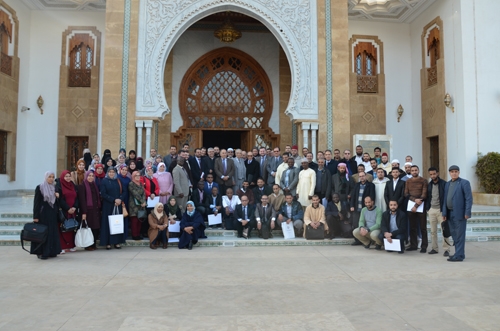
In turn, Mr Sali Shahsivari, Managing Director of Al-Furqān Islamic Heritage Foundation, welcomed the esteemed scholars and researchers taking part in the training course. He thanked them for their gracious cooperation with the scholarly committee organising this veritable feast of knowledge, wishing them a pleasant stay in Rabat and continued professional success. He reminded of the Course’s purpose in complementing the efforts of the two partner institutions in previous training courses. Moreover, it was aligned to Al-Furqān’s plans for the development of practitioners in cataloguing and critical editions in the diverse fields of Islamic heritage.
Dr Bashar Awwad Marouf then spoke on behalf of the lecturers and course delegates. He thanked the Kingdom of Morocco for its accommodating stance towards knowledge and scholars. He also praised both institutions for their efforts in convening this training course.
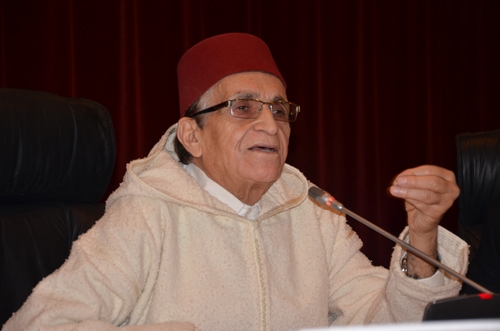
The first session, chaired by Dr Abdel Hamid Achak, comprised a keynote lecture titled “A general introduction to critically editing manuscripts on the Noble Prophet’s biography”, delivered by Dr Mohammed Yessef. The lecturer explored the efforts of Moroccan scholars in the area of Prophetic biography.
The evening session, chaired by Dr Ahmed Chouqui Binebine, was distinguished by the attendance of a large number of scholars and researchers. It comprised a public lecture by Dr Bashar Awwad Marouf, titled “Ibn ‘Abd al-Barr and his book, al-Tamhīd”. Dr Marouf presented and analysed the methodological steps he had followed in critically editing this text, beginning with gathering handwritten manuscript copies up to the stage of creating indexes and bibliographies.
The lecture was followed by the first practical workshop of the training course. This addressed the scholarly criteria that one must observe when selecting suitable manuscripts for the editing process in the academic context. This was led by Dr Mohammed Said Hinchi, Dr Abdel Aali L’mdabbar, Dr Tariq Tatami, and Dr Boushta al-Zafzoufi.
Tuesday, 20 February, the second day of the course, opened with a lecture by Dr Mohammed Said Hinchi on “Some difficulties in critical editing and means to overcome them”. He focused on three key challenges, namely the choice of the manuscript book worthy of critical edition before any other in the particular discipline; preparing a rigorous scholarly report on the project for the book nominated for critical edition; and searching for handwritten copies of the book and collating and studying these fittingly. He concluded his lecture with a practical demonstration of the process for examining handwritten copies of a single book.
Subsequently, Dr Anas Ouajjaj delivered a lecture titled “Editing Manuscripts on the Noble Prophet’s Biography, and History: issues and examples”. He presented some examples of issues faced during his critical edition of the corpus of the erudite scholar, Ibn Diḥyah al-Kalbi.
In the evening session, Dr Ayman Fouad Sayyid gave a lecture titled “Critical editions of historical texts”. He shared his experience in extracting al-Maqrīzī’s Khiṭaṭ from both rough/draft and the autograph or the original copy. He also alluded to his work in critically editing al-Nadim’s Fihrist, and his efforts in gathering the book’s manuscript copies, and the methodology he applied to their study.
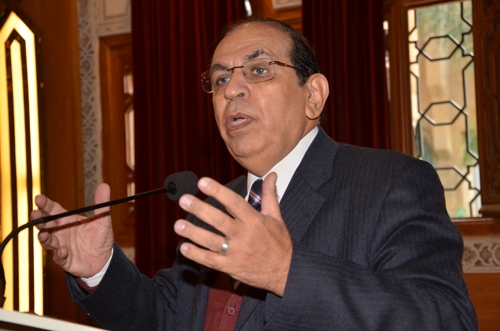
The lecture was followed by the second practical workshop, in which the instructors addressed the scholarly principles applicable to studying manuscript copies when undertaking to edit.
The third day of the training course began with a lecture by Dr Qasim al-Samarrai, titled “The Noble Prophet’s Biography (Sīrah) between critical edition and fabrication”. He explained that authorship on the Prophet’s biography is not something that anyone may embark upon however so they wish. Indeed, it is governed by principles and rules established by leading practitioners in the discipline.
Subsequently, Dr Mohammed bin al-Hussain Baqshish delivered a lecture on “Early sources on the Prophet’s biography and their importance: Selected tracts from al-Maghāzī by Mūsā b. Uqbah as an example”. In it, he examined the early sources of the Prophet’s biography and their significance.
In the evening session, two practical workshops were held. The instructors trained the participating students in how to read the manuscript text, including how to identify the script and symbols used in transcription. Moreover, they covered the correct technique to reproduce the body text, and organise the text into paragraphs, as well as how to perform emendation and collation.
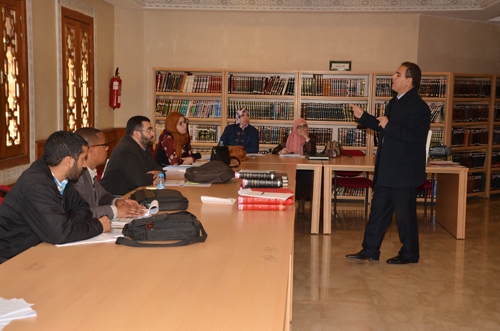
The fourth day of the training course began with a lecture delivered by Dr Abdul Rahman Rashid al-Haqqan titled “Editing the Prophetic biography between early and contemporary scholars: Maghlaṭay b. Qulayj as an example”. In his lecture, he covered some rules relating to critically editing books on Prophetic biography, comparing early and contemporary scholars. He chose Ibn Maghlaṭay as an example through his two books, namely al-Ishārah and al-Zahr al-Bāsim.
This was followed by a lecture delivered by Dr Bashar Awwad Marouf on “Critical edition of unicum manuscripts: al-Barzālī’s Tārīkh as an example”. He mentioned the rules applied to the critical edition of the unicum manuscript, and the difficulties involved in the process. He also emphasised the experience needed by anyone embarking on any such project.
The evening session comprised two practical workshops, in which the instructors covered the techniques involved in creating the different marginalia, with which the critical edition must be endowed.
The fifth day of the training course opened with a lecture by Dr Abdul Rahman Rashid al-Haqqan on “Editing the Prophetic biography between early and contemporary scholars: Mahmud Shakir as an example”. He presented the rules applied to the critical edition of Prophetic biography texts by early scholars. He chose as an example the critical edition of Jamharat Nasab Quraysh wa Akhbārahā authored by Al-Zubayr b. Bakkār that was undertaken by the doyen of Arab critical editors, Shaykh Mahmud Shakir.
This was followed by a lecture delivered by Dr Bashar Awwad Marouf on “Realising the author’s intent: the Prophetic biography and the biographies of the Rightly Guided Caliphs by al-Imām al-Dhahabī as an example”. He emphasised the necessity of adhering to the amendments proposed by the author, even if these appeared after the production of the original copy of the book.
In the evening session, Dr Ahmed Chouqui Binebine presented his lecture on “The concept of abridgement (tahdhīb) in Arabic heritage: Ibn Hishām’s abridgement of Ibn Isḥāq’s Sīrah as an example”.
This was followed by the seventh practical workshop, where the instructors covered the methodology of preparing a scholarly survey, and a detailed descriptive introduction to the critical edition project.
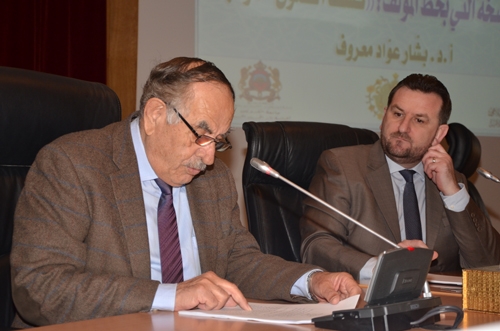
The sixth and final day of the training course commenced with a lecture by Dr Bashar Awwad Marouf on “Critical edition of the author’s holograph copy: Kashf al-ẓunūn as an example”. He presented practical examples from his critical edition of the book, Kashf al-ẓunūn ‘an asāmī al-kutub wa al-funūn, authored by Hājī Khalīfah. He also mentioned examples of the misconceptions to which the editor may succumb: these were highlighted purposely to raise greater awareness in avoiding them.
This was followed by the eighth practical workshop, in which the instructors covered the scholarly rules relating to the preparation of comprehensive indexes for the critically edited text. Constructive and beneficial discussions took place at the end of each lecture and workshop session throughout the training course. These culminated in a set of observations, comments, questions, fine academic points, and gratifyingly entertaining anecdotes.
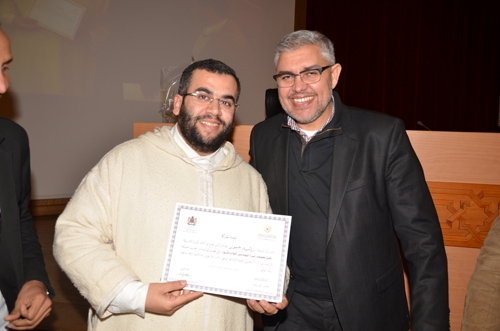
The evening session represented the final one in the training course, concluding with a number of speeches. Dr Ahmad al-Khamlichi thanked Al-Furqān Islamic Heritage Foundation, the participating scholars, and organising committee. He reiterated his commitment to continue collaboration with Al-Furqān in all those scholarly initiatives that serve knowledge and scholars in Morocco. In turn, Mr Mohamed Drioueche spoke on behalf of Al-Furqān Foundation, thanking everyone who had contributed in any capacity to the organisation and delivery of the training course. He also reiterated Al-Furqān Foundation’s intention to organise all kinds of scientific activities serving knowledge and scholars in its defined areas of interest. Dr Bashar Awwad Marouf spoke on behalf of the lecturers and instructors, thanking both partner organisations on the exemplary organisation of the training course, and the wise selection of the course delegates; the latter playing a significant part in its success, by enriching the lectures and practical workshops with their valuable comments and interesting questions.
Subsequently, certificates were awarded to deserving delegates, and a group photograph was taken to commemorate the training course.
Related Video


